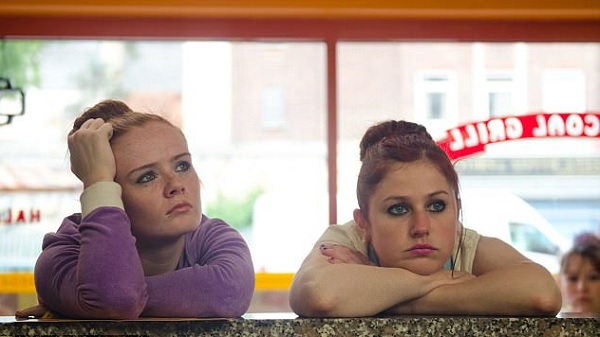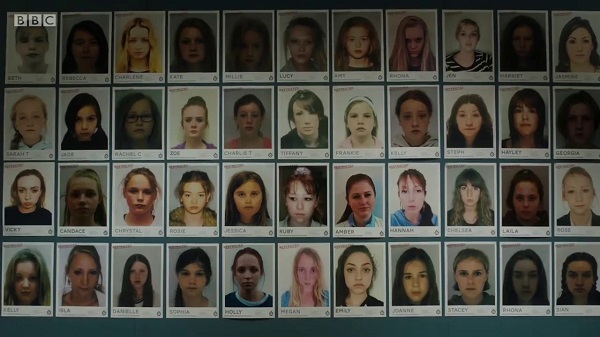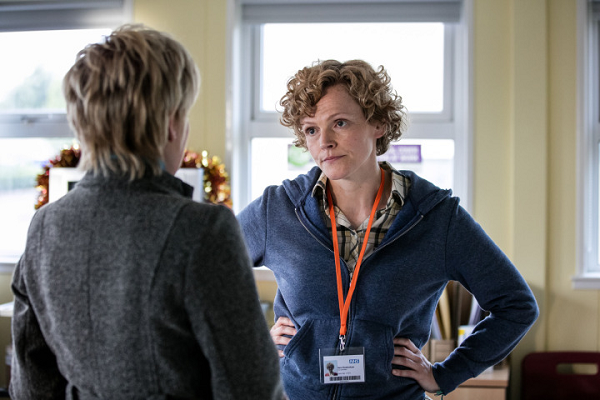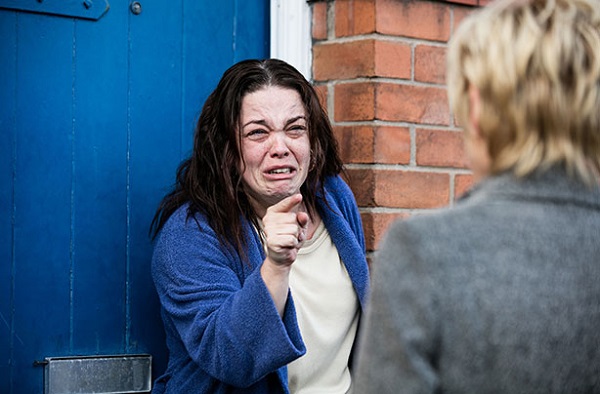Three Girls Review
"A hard-hitting and depressing look at a real crime"
Three Girls is a dramatization of child sexual grooming ring in Rochdale, where men abused teenage girls for years in the Northern English town and led to other cases being discovered across England.
Three Girls was shown over three consecutive nights on BBC One in the UK, and the program follows three victims of the grooming, Holly Winshaw (Molly Windsor), whose family recently moved to the town, and sisters Amber and Ruby Bowen (Ria Zmitrowicz and Liv Hill). These girls are given free food and alcohol by much older men before being using for sex. Over the course of several years, the girls are abused and ignored by police and social services.

Each episode focuses on a different aspect of the case: the first followed the girls as they are groomed and raped, the second was about the police investigation, and the final one shows the trial and the aftermath. The opening to each episode make a point that the series was based on first-hand interviews with the victims and documents related to the case, and the end of each episode stated that the non-fiction book
Girl A was used as a source, although some details were changed to protect the identity of the victims. The mini-series was the first full series written by Nicole Taylor, who has previously written episodes for shows like
The White Queen and
Indian Summers, and experienced TV director Philippa Lowthorpe (
Call the Midwife,
Swallows and Amazons, and
Five Days, another BBC mini-series based on another real-life crime) helmed all three episodes.
Three Girls is obviously tackling a heavy subject and the mini-series is not for the faint of heart. In the first episode, the girls are hit, forced to have sex, and threatened constantly, and the show is actually underplayed compared to testimonies victims have given. One of the most horrific scenes was when Holly was raped for the first time, her attacker forcing her on a mattress and pulling her jeans off, before the camera cuts away from the actual assault. Audience members know what's happening and don't need to be shown. There are stark contrasts in the first episode, like Holly being a normal girl before meeting Amber and Ruby and becoming a 'chav' stereotype when she befriends the Bowens. Another comes from Ruby, who is abused and raped, yet she is a 13-year-old girl with learning needs, acts hyper like she was on a sugar high, and wears a T-Shirt with unicorns on it.

The Rochdale case was controversial because the victims were white and the perpetrators were from Pakistani heritage and there were some fears that the series might inflame racial tensions. The series does briefly touch on these racial themes: the media questions whether police refused to investigate because they did not want to be accused of racism - one of the abusers did play the race card at the trial and the far-right protested the trial. After the trial there were questions being asked by the main prosecutor (a man of Pakistani heritage) about how much the Pakistani community knew. There was sadly some truth that fears of racism did prevent the crimes being investigated: Labour MP Jack Straw was pilloried when he raised the issue and in Rotherham, where there was a similar case a social worker tried to bring it to the attention of the authorities, they were forced to undergo racial sensitivity training. In Rotherham, Pakistani girls were also abused by men in grooming gangs as well as white girls. What the series makes clear is that abusers are criminals regardless of race, class, or creed.
The series' main focus was on the impact on the girls and how the police and public services failed them. Sara Rowbotham, the sexual health worker who first brought the case to the attention of the authorities, and Nazir Afzal, the chief prosecutor who brought the case to court, have both praised
Three Girls for
being very true to the events. The drama goes to great effort to try and cover as many aspects of the case as possible and it is
commendable with how extensive the series was. No matter what stage of the investigation the girls suffered, whether it's the abuse itself, reliving the experience when interviewed by the police and being questioned by nine defense barristers who try to discredit them.

The prejudice towards the girls is looked at in the show – the victims were from broken homes and were dismissed as unreliable witnesses or it was alleged they brought it on themselves. A tragic scene occurs when Holly finds out she’s pregnant, but when social services come to visit, they were worried for the safety of the unborn child but not the 15-year-old carrying it because Holly was classed as a "child prostitute." It's frustrating that the authorities didn't use better judgment. DC Margaret Oliver (Lesley Sharp) also states that the police need to end its attitude of "families like that": working class and impoverished families that the authorities often wrote-off and Holly's dad even questions why his daughter went back to her abusers after reporting a rape to the police.
The first episode focused on Holly because she could act as an audience surrogate. Holly had just moved to the town, and so was new to the grooming process, whilst Ruby and Amber were already in the middle of it. Holly’s reaction was one of fear and dread when she was with the men and she used alcohol to numb the pain – she has a thousand yard stare when she’s being driven to another town to have sex. She is only able to act at home against her parents' (Paul Kaye and Jill Halfpenny) wishes and this fighting makes the situation worse because Holly would often run off and end up in the hands of her rapists. It was a vicious cycle.

The girls have different reactions to their ordeals. Holly falls into drinking and depression, spending her time in her room staring blankly at the walls. Amber has to be complicit with the abusers to ease her suffering and ends up being accused of child exploitation herself, leading her to turn against Holly in her testimony. Ruby doesn't even think she was being abused because of her learning needs: her naivety made her believe the abusers actually loved her. All three actresses gave believable performances in their roles of the victims.
Three Girls also has a supporting cast of established of British actors like Maxine Peake (
The Theory of Everything), Paul Kaye (Thoros of Myr in
Game of Thrones), and Lesley Sharp. Peake was the highlight as Sara, the impassioned woman who's fighting against a broken system; when the police finally do ask for her help she tells them "fuck off" in a powerful, bitter speech. However, Kaye and Lisa Riley's performances as Holly and the Bowen girls' parents, fell into melodrama and overacting when dealing with their extreme situations. It just descended into shouting and it came off as a case of the actors trying too hard to act distressed.
Three Girls was an intense drama that was enhanced by the quality of its three young leads. It will leave audiences saddened and angry, because of how the victims and the people were trying to help, were failed by the state.
Pros
- A comprehensive look at a horrific crime
- Excellent acting from the three young leads
Cons
- Some over acting from Paul Kaye and Lisa Riley
- Not for the faint-hearted
 Each episode focuses on a different aspect of the case: the first followed the girls as they are groomed and raped, the second was about the police investigation, and the final one shows the trial and the aftermath. The opening to each episode make a point that the series was based on first-hand interviews with the victims and documents related to the case, and the end of each episode stated that the non-fiction book Girl A was used as a source, although some details were changed to protect the identity of the victims. The mini-series was the first full series written by Nicole Taylor, who has previously written episodes for shows like The White Queen and Indian Summers, and experienced TV director Philippa Lowthorpe (Call the Midwife, Swallows and Amazons, and Five Days, another BBC mini-series based on another real-life crime) helmed all three episodes.
Three Girls is obviously tackling a heavy subject and the mini-series is not for the faint of heart. In the first episode, the girls are hit, forced to have sex, and threatened constantly, and the show is actually underplayed compared to testimonies victims have given. One of the most horrific scenes was when Holly was raped for the first time, her attacker forcing her on a mattress and pulling her jeans off, before the camera cuts away from the actual assault. Audience members know what's happening and don't need to be shown. There are stark contrasts in the first episode, like Holly being a normal girl before meeting Amber and Ruby and becoming a 'chav' stereotype when she befriends the Bowens. Another comes from Ruby, who is abused and raped, yet she is a 13-year-old girl with learning needs, acts hyper like she was on a sugar high, and wears a T-Shirt with unicorns on it.
Each episode focuses on a different aspect of the case: the first followed the girls as they are groomed and raped, the second was about the police investigation, and the final one shows the trial and the aftermath. The opening to each episode make a point that the series was based on first-hand interviews with the victims and documents related to the case, and the end of each episode stated that the non-fiction book Girl A was used as a source, although some details were changed to protect the identity of the victims. The mini-series was the first full series written by Nicole Taylor, who has previously written episodes for shows like The White Queen and Indian Summers, and experienced TV director Philippa Lowthorpe (Call the Midwife, Swallows and Amazons, and Five Days, another BBC mini-series based on another real-life crime) helmed all three episodes.
Three Girls is obviously tackling a heavy subject and the mini-series is not for the faint of heart. In the first episode, the girls are hit, forced to have sex, and threatened constantly, and the show is actually underplayed compared to testimonies victims have given. One of the most horrific scenes was when Holly was raped for the first time, her attacker forcing her on a mattress and pulling her jeans off, before the camera cuts away from the actual assault. Audience members know what's happening and don't need to be shown. There are stark contrasts in the first episode, like Holly being a normal girl before meeting Amber and Ruby and becoming a 'chav' stereotype when she befriends the Bowens. Another comes from Ruby, who is abused and raped, yet she is a 13-year-old girl with learning needs, acts hyper like she was on a sugar high, and wears a T-Shirt with unicorns on it.
 The Rochdale case was controversial because the victims were white and the perpetrators were from Pakistani heritage and there were some fears that the series might inflame racial tensions. The series does briefly touch on these racial themes: the media questions whether police refused to investigate because they did not want to be accused of racism - one of the abusers did play the race card at the trial and the far-right protested the trial. After the trial there were questions being asked by the main prosecutor (a man of Pakistani heritage) about how much the Pakistani community knew. There was sadly some truth that fears of racism did prevent the crimes being investigated: Labour MP Jack Straw was pilloried when he raised the issue and in Rotherham, where there was a similar case a social worker tried to bring it to the attention of the authorities, they were forced to undergo racial sensitivity training. In Rotherham, Pakistani girls were also abused by men in grooming gangs as well as white girls. What the series makes clear is that abusers are criminals regardless of race, class, or creed.
The series' main focus was on the impact on the girls and how the police and public services failed them. Sara Rowbotham, the sexual health worker who first brought the case to the attention of the authorities, and Nazir Afzal, the chief prosecutor who brought the case to court, have both praised Three Girls for being very true to the events. The drama goes to great effort to try and cover as many aspects of the case as possible and it is commendable with how extensive the series was. No matter what stage of the investigation the girls suffered, whether it's the abuse itself, reliving the experience when interviewed by the police and being questioned by nine defense barristers who try to discredit them.
The Rochdale case was controversial because the victims were white and the perpetrators were from Pakistani heritage and there were some fears that the series might inflame racial tensions. The series does briefly touch on these racial themes: the media questions whether police refused to investigate because they did not want to be accused of racism - one of the abusers did play the race card at the trial and the far-right protested the trial. After the trial there were questions being asked by the main prosecutor (a man of Pakistani heritage) about how much the Pakistani community knew. There was sadly some truth that fears of racism did prevent the crimes being investigated: Labour MP Jack Straw was pilloried when he raised the issue and in Rotherham, where there was a similar case a social worker tried to bring it to the attention of the authorities, they were forced to undergo racial sensitivity training. In Rotherham, Pakistani girls were also abused by men in grooming gangs as well as white girls. What the series makes clear is that abusers are criminals regardless of race, class, or creed.
The series' main focus was on the impact on the girls and how the police and public services failed them. Sara Rowbotham, the sexual health worker who first brought the case to the attention of the authorities, and Nazir Afzal, the chief prosecutor who brought the case to court, have both praised Three Girls for being very true to the events. The drama goes to great effort to try and cover as many aspects of the case as possible and it is commendable with how extensive the series was. No matter what stage of the investigation the girls suffered, whether it's the abuse itself, reliving the experience when interviewed by the police and being questioned by nine defense barristers who try to discredit them.
 The prejudice towards the girls is looked at in the show – the victims were from broken homes and were dismissed as unreliable witnesses or it was alleged they brought it on themselves. A tragic scene occurs when Holly finds out she’s pregnant, but when social services come to visit, they were worried for the safety of the unborn child but not the 15-year-old carrying it because Holly was classed as a "child prostitute." It's frustrating that the authorities didn't use better judgment. DC Margaret Oliver (Lesley Sharp) also states that the police need to end its attitude of "families like that": working class and impoverished families that the authorities often wrote-off and Holly's dad even questions why his daughter went back to her abusers after reporting a rape to the police.
The first episode focused on Holly because she could act as an audience surrogate. Holly had just moved to the town, and so was new to the grooming process, whilst Ruby and Amber were already in the middle of it. Holly’s reaction was one of fear and dread when she was with the men and she used alcohol to numb the pain – she has a thousand yard stare when she’s being driven to another town to have sex. She is only able to act at home against her parents' (Paul Kaye and Jill Halfpenny) wishes and this fighting makes the situation worse because Holly would often run off and end up in the hands of her rapists. It was a vicious cycle.
The prejudice towards the girls is looked at in the show – the victims were from broken homes and were dismissed as unreliable witnesses or it was alleged they brought it on themselves. A tragic scene occurs when Holly finds out she’s pregnant, but when social services come to visit, they were worried for the safety of the unborn child but not the 15-year-old carrying it because Holly was classed as a "child prostitute." It's frustrating that the authorities didn't use better judgment. DC Margaret Oliver (Lesley Sharp) also states that the police need to end its attitude of "families like that": working class and impoverished families that the authorities often wrote-off and Holly's dad even questions why his daughter went back to her abusers after reporting a rape to the police.
The first episode focused on Holly because she could act as an audience surrogate. Holly had just moved to the town, and so was new to the grooming process, whilst Ruby and Amber were already in the middle of it. Holly’s reaction was one of fear and dread when she was with the men and she used alcohol to numb the pain – she has a thousand yard stare when she’s being driven to another town to have sex. She is only able to act at home against her parents' (Paul Kaye and Jill Halfpenny) wishes and this fighting makes the situation worse because Holly would often run off and end up in the hands of her rapists. It was a vicious cycle.
 The girls have different reactions to their ordeals. Holly falls into drinking and depression, spending her time in her room staring blankly at the walls. Amber has to be complicit with the abusers to ease her suffering and ends up being accused of child exploitation herself, leading her to turn against Holly in her testimony. Ruby doesn't even think she was being abused because of her learning needs: her naivety made her believe the abusers actually loved her. All three actresses gave believable performances in their roles of the victims.
Three Girls also has a supporting cast of established of British actors like Maxine Peake (The Theory of Everything), Paul Kaye (Thoros of Myr in Game of Thrones), and Lesley Sharp. Peake was the highlight as Sara, the impassioned woman who's fighting against a broken system; when the police finally do ask for her help she tells them "fuck off" in a powerful, bitter speech. However, Kaye and Lisa Riley's performances as Holly and the Bowen girls' parents, fell into melodrama and overacting when dealing with their extreme situations. It just descended into shouting and it came off as a case of the actors trying too hard to act distressed.
Three Girls was an intense drama that was enhanced by the quality of its three young leads. It will leave audiences saddened and angry, because of how the victims and the people were trying to help, were failed by the state.
The girls have different reactions to their ordeals. Holly falls into drinking and depression, spending her time in her room staring blankly at the walls. Amber has to be complicit with the abusers to ease her suffering and ends up being accused of child exploitation herself, leading her to turn against Holly in her testimony. Ruby doesn't even think she was being abused because of her learning needs: her naivety made her believe the abusers actually loved her. All three actresses gave believable performances in their roles of the victims.
Three Girls also has a supporting cast of established of British actors like Maxine Peake (The Theory of Everything), Paul Kaye (Thoros of Myr in Game of Thrones), and Lesley Sharp. Peake was the highlight as Sara, the impassioned woman who's fighting against a broken system; when the police finally do ask for her help she tells them "fuck off" in a powerful, bitter speech. However, Kaye and Lisa Riley's performances as Holly and the Bowen girls' parents, fell into melodrama and overacting when dealing with their extreme situations. It just descended into shouting and it came off as a case of the actors trying too hard to act distressed.
Three Girls was an intense drama that was enhanced by the quality of its three young leads. It will leave audiences saddened and angry, because of how the victims and the people were trying to help, were failed by the state.